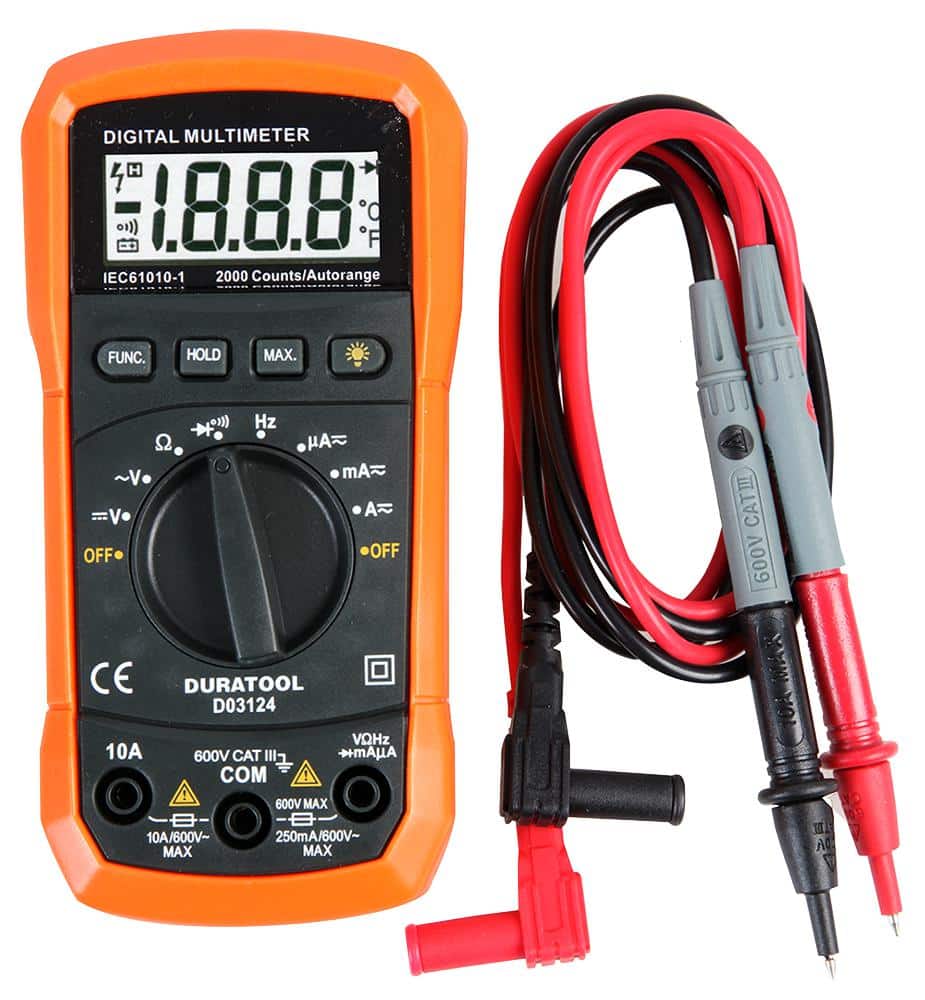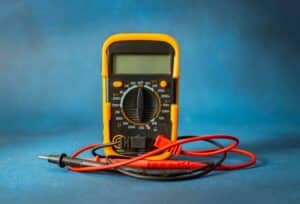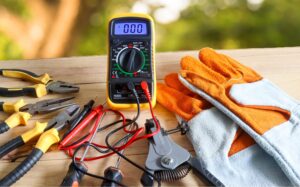Introduction to Digital Multimeter (DMM) Calibration
What is a Digital Multimeter?
 Digital multimeter calibration is the process of verifying and adjusting the accuracy of a multimeter to ensure it delivers precise electrical measurements. In industries where even the slightest error can have serious consequences, like medical device manufacturing, aerospace, and biotechnology, calibrated equipment is not optional, it’s essential. Whether you're measuring voltage, current, or resistance, the reliability of your digital multimeter directly impacts product safety, regulatory compliance, and operational performance.
Digital multimeter calibration is the process of verifying and adjusting the accuracy of a multimeter to ensure it delivers precise electrical measurements. In industries where even the slightest error can have serious consequences, like medical device manufacturing, aerospace, and biotechnology, calibrated equipment is not optional, it’s essential. Whether you're measuring voltage, current, or resistance, the reliability of your digital multimeter directly impacts product safety, regulatory compliance, and operational performance.
Why Calibrate Your Digital Multimeter?
Over time, even the most advanced multimeters can drift out of spec. Factors like frequent use, exposure to temperature fluctuations, humidity, and general wear all contribute to subtle changes in measurement accuracy. Without regular calibration of multimeters, these small shifts can lead to major consequences, especially in industries where precision is non-negotiable.
In critical environments such as medical device manufacturing, aerospace, and biotechnology, relying on uncalibrated equipment can result in false readings, failed audits, product recalls, or even safety hazards. A digital multimeter that hasn’t been properly calibrated can silently undermine your operations and your compliance posture.
How Often Should You Calibrate Your Digital Multimeter?
The typical calibration interval for many companies is a 12-month cycle. This annual interval is widely accepted across industries to ensure consistent measurement accuracy and compliance with quality standards.
However, certain factors may require more frequent calibration. These include high-frequency use, exposure to harsh environments (such as extreme temperatures or humidity), and the criticality of the measurements being taken. Instruments used on production lines, in field service, or in mobile test environments often need shorter calibration intervals to maintain reliability.
In regulated sectors like medical device manufacturing and aerospace, the stakes are even higher. Multimeters used in these industries may need to follow a more aggressive calibration schedule to align with strict compliance frameworks like ISO 13485 and AS9100.
Digital Multimeter Calibration Procedure
A proper digital multimeter calibration procedure ensures that each measurement function of the device performs within manufacturer specifications and meets compliance requirements. We use reference instruments that are traceable to the International System of Units (SI) through NIST, other National Metrology Institutes, natural physical constants, intrinsic standards or ratio techniques with uncertainty typically four times greater than the unit under test, maintaining the industry-recommended 4:1 test uncertainty ratio. When a 4:1 ratio cannot be maintained, techniques, such as guard banding, or customer specified decision rules are used.
Below is a breakdown of the multimeter calibration procedure by measurement function:
DC Voltage Calibration
Multiple voltage levels are applied to verify linearity and offset accuracy. Technicians test the multimeter’s response from millivolts to high-voltage ranges and adjust internal parameters as needed to ensure traceability to reference standards.
AC Voltage Calibration
True RMS voltages are applied across a range of frequencies. This checks the multimeter’s frequency response and waveform accuracy. Calibration ensures the meter provides reliable readings under varying real-world conditions.
Resistance Calibration (2-Wire and 4-Wire)
Known resistors are used to test the accuracy of resistance readings across low to high ohmic values. For precision meters, 4-wire (Kelvin) calibration is performed to eliminate lead and contact resistance effects.
Current Measurement Calibration
Both AC and DC current values are injected to verify the multimeter’s ability to read current accurately. The procedure includes evaluating gain and linearity across the device’s specified current ranges.
Additional Functions
Where applicable, calibration also includes functions such as capacitance, frequency, continuity, diode testing, and temperature measurement. Each is evaluated against precise reference values to ensure full functionality.
The result is a fully documented and traceable calibration certificate that details the "as found" and "as left" data, test points, tolerances, uncertainties, and equipment used. SIMCO’s comprehensive digital multimeter calibration procedure gives you confidence in every reading—and helps you maintain compliance with industry standards.

Equipment Used for Multimeter Calibration
High-accuracy calibration starts with the right tools.
Before calibration begins, each multimeter is allowed to stabilize for 1–2 hours to match lab conditions. We then use high-precision multimeter calibration units—including voltage and current sources, resistance standards, and frequency generators—to evaluate and adjust the device under test.
Multimeter Calibration Near Me: Nationwide Lab & On-Site Services
When you're searching for multimeter calibration near me, SIMCO offers unmatched convenience and consistency. With a nationwide network of ISO/IEC 17025-accredited calibration laboratories, we provide reliable, high-precision service no matter where you operate.
Need to minimize downtime? SIMCO also offers on-site calibration services—bringing our accredited processes and expert technicians directly to your facility. Whether you prefer in-lab service for full traceability or on-site support to keep operations moving, you’ll receive the same high-quality results across all locations.
Industry Applications for Digital Multimeter Calibration
Digital multimeters are used across a wide range of industries—but in regulated environments like medical, aerospace, and biotech, accuracy isn’t just preferred—it’s required.
Medical Device Manufacturing
In the medical field, precision isn’t optional. Devices used to diagnose, monitor, or treat patients must meet exacting standards, and any deviation in electrical measurement can compromise safety or result in noncompliance with ISO 13485 or FDA regulations. Calibrated multimeters are essential for validating circuit integrity, testing sensors, and maintaining quality throughout the production lifecycle.

Aerospace & Defense
In aerospace and defense, every measurement has mission-critical implications. Whether it's avionics, control systems, or ground-support equipment, even small inaccuracies can result in system failure or safety hazards. Digital multimeter calibration helps ensure compliance with AS9100 standards and supports rigorous quality and safety requirements mandated by military and aviation authorities.
Biotechnology
Biotech environments rely heavily on precision instruments for research, diagnostics, and automated lab equipment. Uncalibrated multimeters can lead to unreliable data, failed validations, and compromised outcomes.
Digital Multimeter Calibration FAQ
Have questions about digital multimeter calibration? You’re not alone. Below are some of the most common questions we hear from engineers, quality managers, and compliance teams.
What kinds of errors can occur in an uncalibrated multimeter?
Uncalibrated multimeters can suffer from several error types, including offset errors, gain drift, linearity issues, and temperature sensitivity. These inaccuracies may not be visible on the display but can significantly impact test results—especially in critical applications.
Can I calibrate my digital multimeter myself?
Some modern multimeters include self-check features or internal adjustment routines. However, these do not replace formal calibration. Only an ISO/IEC 17025-accredited lab can provide traceable, documented calibration that meets regulatory and quality standards. For regulated industries, self-calibration isn’t sufficient for audit or compliance purposes.
What’s included in a SIMCO calibration certificate?
Our calibration certificates include comprehensive data such as "as found" and "as left" conditions, measurement uncertainties, calibration date, test points, tolerance ranges, and the reference standards used that are traceable to the International System of Units (SI) through NIST, other National Metrology Institutes, natural physical constants, intrinsic standards or ratio techniques. This documentation supports internal quality systems and external audits.
What is the average multimeter calibration cost?
The multimeter calibration cost depends on the model, the number of functions tested, and whether the service is performed on-site or in one of our labs. We offer competitive pricing with flexible options tailored to your specific needs.
Digital Multimeter Calibration Services
Whether you're managing a single instrument or an entire fleet, SIMCO delivers precise, reliable digital multimeter calibration services designed for regulated industries. Our ISO/IEC 17025-accredited processes ensure every calibration meets the highest standards for accuracy, traceability, and compliance.
Looking for Digital Multimeter calibration services? SIMCO can help! Request a quote today to get started.

